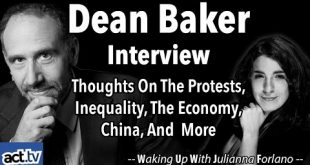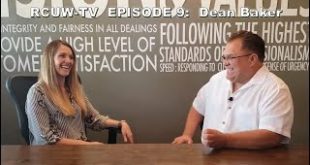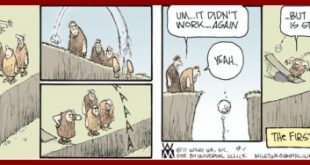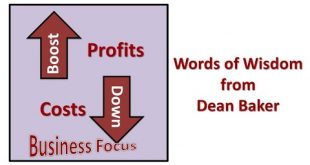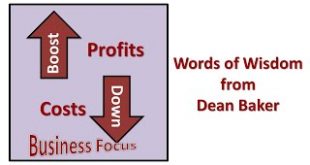Follow on Twitch: https://www.twitch.tv/actdottv Julianna welcomes back recurring guest Dean Baker, macroeconomist and co-founder of the Center for Economic and Policy Research, to discuss a few main issues we are all experiencing today... including his thoughts on the George Floyd Protests, inequality, the Economy, the Trade War in China, and More. The interview was originally supposed to focus on how the U.S. made major changes to the way it trades with China this month, with both Trump...
Read More »Dean Baker Interview: Thoughts On The Protests, Inequality, The Economy, China, And More
Follow on Twitch: https://www.twitch.tv/actdottv Julianna welcomes back recurring guest Dean Baker, macroeconomist and co-founder of the Center for Economic and Policy Research, to discuss a few main issues we are all experiencing today... including his thoughts on the George Floyd Protests, inequality, the Economy, the Trade War in China, and More. The interview was originally supposed to focus on how the U.S. made major changes to the way it trades with China this month, with both Trump...
Read More »Two definitions
from Peter Radford It is always interesting to read what people say in response to what you write. It is also always educational. I enjoy the learning. I recently wrote a short piece meant to be a little on the light side pondering the odd comparison of the use of the word essential in our vernacular understanding of it, and the way in which standard economic theory suggests we compute our various levels of worth. I quoted J.B. Clark with respect to this latter point. I made the...
Read More »Doing our morning routine part 1
Microfoundations — neither law nor true
from Lars Syll Simon Wren-Lewis is one of many mainstream economists that staunchly defends the idea that having microfoundations for macroeconomics moves macroeconomics forward. A couple of years ago he wrote this: I think the two most important microfoundation led innovations in macro have been intertemporal consumption and rational expectations … [T]he adoption of rational expectations was not the result of some previous empirical failure. Instead it represented, as Lucas said, a...
Read More »Central Banks: Monopoly or Public Service?
from Asad Zaman The Reagan-Thatcher revolution in the late 1970’s consisted of a move towards free markets, and away from government regulation and control. Of central importance in this move was the deregulation of financial institutions. We would like to understand WHY this change took place, and WHAT were the effects of this change on the working of the USA/UK economies. Summary of Basic Facts: Financial de-regulation, guided by an ideological belief that free financial markets would...
Read More »Words of wisdom from Dean Baker
Explain : Dean Baker 's Wisdom Quotes [Dean Baker is an American macroeconomist and co-founder, with Mark Weisbrot, of the Center for Economic and Policy Research (CEPR) in Washington, D.C. He is credited as being one of the first economists to have identified the 2007–2008 United States housing bubble.]
Read More »Words of wisdom from Dean Baker
Explain : Dean Baker 's Wisdom Quotes [Dean Baker is an American macroeconomist and co-founder, with Mark Weisbrot, of the Center for Economic and Policy Research (CEPR) in Washington, D.C. He is credited as being one of the first economists to have identified the 2007–2008 United States housing bubble.]
Read More »Two definitions
from Peter Radford Are economists so befuddled by the elegance of their machinery that words have lost all meaning? Two definitions, one for ‘essential’ and the other for the way in which, according to economics, people are rewarded for their work. In recent weeks we have become accustomed to calling someone an ‘essential worker’. These are our most important people. They are, if the dictionary doesn’t lie, indispensable. They are extremely important. They are key, crucial, vital, and...
Read More » Real-World Economics Review
Real-World Economics Review

